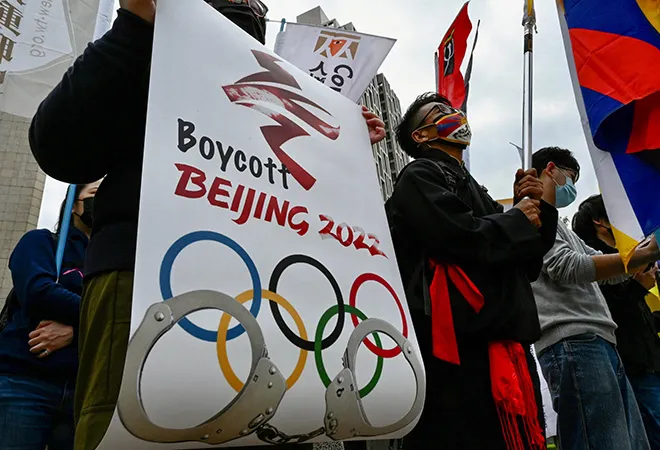
On 6 December, 2021, the Biden administration announced that the US government officials will boycott the upcoming winter Olympics in Beijing citing grave human rights abuses, especially the host country’s genocide against the Uyghur Muslims in the western province of Xinjiang. Though US’ athletes will participate in the games, the move is seen as hardening of America’s stance against China, given the ongoing trade war between the two countries. According to White House press secretary Jen Psaki, “U.S. diplomatic or official representation would treat these games as business as usual in the face of the PRC's egregious human rights abuses and atrocities in Xinjiang, and we simply can't do that.” The decision to boycott is based on Biden’s call for “Human rights must be at the core—not periphery—of our engagement in the world” during the 2020 presidential campaign.
The boycott call got full bipartisan support from both republican and democratic lawmakers. Following the announcement, other democratic countries like New Zealand, the UK, Canada and Australia also joined the call. Australian Prime Minister even stated that the action was in “Australia's national interest”.
While China has called the move a “political farce,” the diplomatic boycott of the Beijing Winter Olympics has indeed come as a blow, coming on the heels of a three-and-a-half-hour-long virtual summit between President Xi Jinping and President Joe Biden on 15 November. Chinese Foreign Ministry spokesman Zhao Lijian accused the US of violating “political neutrality in sport” and said Beijing will take “resolute counter-measures”.
Trumps divergence made China belligerent
In the post-Cold War era, human rights have been central to US foreign policy, which has sought to champion democratic systems and civil liberties around the world. However, Donald Trump and his administration focused on the ‘America First’ approach and divorced America’s long-standing tradition of upholding such core values from the country’s foreign policy, especially against a belligerent China. Donald Trump is accused of being soft on China over human rights and for even tacitly supporting Xi Jinping’s actions in Xinjiang. Former US National Security Adviser, John Bolton, has directly accused the Trump administration for going soft on China. Bolton wrote that in June 2019, during the opening dinner of the Osaka G-20 meeting, “Xi had explained to Trump why he was basically building concentration camps in Xinjiang. According to our interpreter, Trump said that Xi should go ahead with building the camps, which Trump thought was exactly the right thing to do.” Instead, in line with his ‘America First’ policy, Trump confronted China on trade, adopted a protectionist strategy by imposing tariffs on US $360-billion worth of Chinese goods and also challenged Beijing on technology and its maritime posturing in the South China Sea.
This divergence in US’ foreign policy under Trump was used by Xi since 2017 to build a “Great Wall of iron” for the protection of China’s national unity and solidarity in the troubled Xinjiang province. Under the new hardened approach, Beijing rolled out a securitisation strategy and made Xinjiang China’s most high-tech surveillance zone. Beijing has spent US $700 million since 2017 to construct 1,200 detention camps across Xinjiang, where more than 1 million Uyghurs have been held captive. Mass rapes, torture through waterboarding, and illegal organ harvesting have become rampant in these detention camps. The detainees have been used for forced labour, Uyghur women are subjected to forced sterilisations, implantation of contraceptive devices, and abortions through state sponsored campaigns. In Khotan and Kashgar, cities in southern Xinjiang, such atrocities led to a fall in the natural population growth rate of Uyghurs by 84 percent between 2015 and 2018, from 1.6 percent to 0.26 percent.
However, unlike Trump’s trade war and America first policy, the Biden administration has put the focus of the US foreign policy back on a rights-based global order and reinforced America’s long-standing tradition of being the world’s vanguard of human rights.
In 2020, rising anti-Chinese sentiments within the US on human rights violations and the COVID-19 pandemic prompted the Republicans and Democrats to adopt a hardline approach on China’s suppression of Uyghur Muslims in Xinjiang. The Senate passed the Uyghur Human Rights Policy Act of 2020 to sanction the Chinese officials responsible for gross violations of human rights. The US State Department also declared China’s actions against the Uyghurs as genocide.
After becoming president, Joe Biden made human rights once again a central pillar of US’ foreign policy and became more critical of China on the Uyghur issue. During his first call to Xi after becoming president, Biden voiced concern over the Hong Kong crackdown and the Xinjiang internments and human rights violations. He even categorically criticised President Xi over the abuse of the Muslim Uyghurs in Xinjiang and the crackdown in Hong Kong during the bilateral virtual summit on 16 November. Subsequently, on 10 December, the World Human Rights Day, the US government imposed extensive human rights-related sanctions on dozens of people and entities tied to China, including Sensetime Group, the Chinese artificial intelligence company.
Boycott of Beijing Winter Olympics and its impact
Uyghurs, Tibetans, Hong Kongers, and Taiwanese and other human rights groups started campaigns for the boycott of the Beijing Winter Olympics campaign in democratic countries. These groups welcomed the move of diplomatic boycott, but what they had campaigned was for a complete boycott. These groups are of the belief that participation in the Beijing Winter Olympics would only be an endorsement of Beijing’s genocide against its Uyghur Muslims and other minorities. These groups have also accused the International Olympic Committee (IOC) of putting profit over human rights and turning a blind eye to the atrocities.
While China has called the move a “political farce,” the diplomatic boycott of the Beijing Winter Olympics has indeed come as a blow, coming on the heels of a three-and-a-half-hour-long virtual summit between President Xi Jinping and President Joe Biden on 15 November
The Beijing Olympics is a matter of prestige for Xi, and the Chinese Communist Party has already started its intimidating policy by gaining the support of 53 African countries. On 30 November, during the China-Africa summit, these countries adopted a declaration in support of the Beijing Winter Olympics and denounced the politicisation of the event. Given such a divide in the international voice, the type of impact the diplomatic boycott of the games by only a handful of major democracies will have on Xi’s belligerent behaviour towards Uyghurs and other minorities remains to be seen. However, unlike Trump’s trade war and America first policy, the Biden administration has put the focus of the US foreign policy back on a rights-based global order and reinforced America’s long-standing tradition of being the world’s vanguard of human rights.
The views expressed above belong to the author(s). ORF research and analyses now available on Telegram! Click here to access our curated content — blogs, longforms and interviews.




 PREV
PREV


